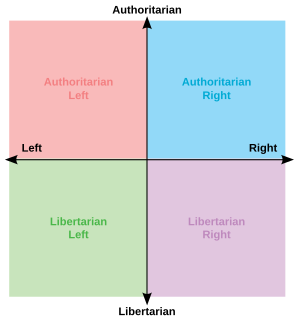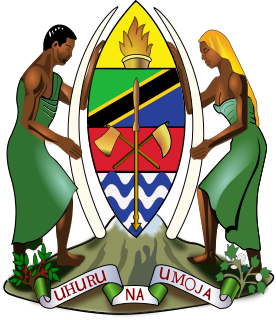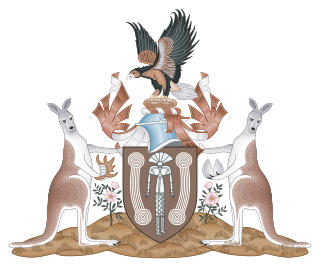The executive is the organ exercising authority in and holding responsibility for the governance of a state. The executive executes and enforces law.
In law and government, de facto describes practices that exist in reality, even if not officially recognized by laws. It is commonly used to refer to what happens in practice, in contrast with de jure, which refers to things that happen according to law. Unofficial customs that are widely accepted are sometimes called de facto standards.

The political compass is a multi-axis political model used by the website of the same name to label or organise political thought on two dimensions. In its selection and representation of these two dimensions, it is similar to the Nolan Chart and Pournelle chart. The term 'political compass' is claimed as a trademark by the British website Pace News Limited, which uses responses to a set of 61 propositions to rate political ideology on two axes: economic (left–right) and social (authoritarian–libertarian). The site also includes an explanation of the two-axis system they use, a few charts which place various past and present political figures according to their estimation and reading lists for each of the main political orientations.
Leadership is both a research area and a practical skill encompassing the ability of an individual or organization to "lead" or guide other individuals, teams, or entire organizations. Specialist literature debates various viewpoints, contrasting Eastern and Western approaches to leadership, and also United States versus European approaches. U.S. academic environments define leadership as "a process of social influence in which a person can enlist the aid and support of others in the accomplishment of a common task".
Charismatic authority is a concept of leadership developed by the German sociologist Max Weber. It involves a type of organization or a type of leadership in which authority derives from the charisma of the leader. This stands in contrast to two other types of authority: legal authority and traditional authority. Each of the three types forms part of Max Weber's tripartite classification of authority.
The Führerprinzip [ˈfyːʀɐpʀɪnˌtsiːp] (listen) prescribed the fundamental basis of political authority in the governmental structures of the Third Reich. This principle can be most succinctly understood to mean that "the Führer's word is above all written law" and that governmental policies, decisions, and offices ought to work toward the realization of this end. In actual political usage, it refers mainly to the practice of dictatorship within the ranks of a political party itself, and as such, it has become an earmark of political fascism.

The Quebec general election of 1985 was held on December 2, 1985, to elect members of the National Assembly of the Province of Quebec, Canada. The Quebec Liberal Party, led by former premier Robert Bourassa, defeated the incumbent Parti Québécois, led by Premier Pierre-Marc Johnson.

The regional chambers of England were a group of indirectly elected regional bodies that were created by the provisions of the Regional Development Agencies Act 1998. There were eight regional chambers, one for each of the regions of England except Greater London, which had opted for an elected mayor and assembly in 1998. All eight regional chambers had adopted the title "regional assembly" or "assembly" as part of their name, though this was not an official status in law. The chambers were abolished over a two-year period between 31 March 2008 and 31 March 2010 and some of their functions were assumed by newly established Local authority leaders' boards.

A caliphate is an Islamic state under the leadership of an Islamic steward with the title of caliph, a person considered a religious successor to the Islamic prophet Muhammad and a leader of the entire ummah (community). Historically, the caliphates were polities based
in Islam which developed into multi-ethnic trans-national empires. During the medieval period, three major caliphates succeeded each other: the Rashidun Caliphate (632–661), the Umayyad Caliphate (661–750) and the Abbasid Caliphate (750–1258). In the fourth major caliphate, the Ottoman Caliphate, the rulers of the Ottoman Empire claimed caliphal authority from 1517. During the history of Islam, a few other Muslim states, almost all hereditary monarchies, have claimed to be caliphates.

The Anarchical and Revolutionary Crimes Act of 1919, popularly known as the Rowlatt Act or Black Act, was a legislative act passed by the Imperial Legislative Council in Delhi on 10 March 1919, indefinitely extending the emergency measures of preventive indefinite detention, incarceration without trial and judicial review enacted in the Defence of India Act 1915 during the First World War. It was enacted in light of a perceived threat from revolutionary nationalist organisations of re-engaging in similar conspiracies as during the war which the Government felt the lapse of the DIRA regulations would enable.
The Kavkaz Center is a privately run website/portal which aims to be "a Chechen internet agency which is independent, international and Islamic". The stated mission of the site is to report events related to Chechnya and also to "provide international news agencies with news-letters, background information and assistance in making independent journalistic work in Caucasus".

The Prime Minister of the United Republic of Tanzania is the leader of government business in the National Assembly. The position is subordinated to the President, the head of government.

IEEE Spectrum is a magazine edited by the Institute of Electrical and Electronics Engineers. The IEEE's description of it is:

The Government of the Northern Territory of Australia, also referred to as the Northern Territory Government, is the Australian territorial democratic administrative authority of the Northern Territory. The Government of Northern Territory was formed in 1978 with the granting of self-government to the Territory. The Northern Territory is a territory of the Commonwealth of Australia, and the Constitution of Australia and Commonwealth law regulates its relationship with the Commonwealth.

The Arizona House of Representatives is the lower house of the Arizona Legislature, the state legislature of the U.S. state of Arizona. The upper house is the Senate. Its members are elected to two-year terms with a term limit of four consecutive terms. Members of the Republican Party currently hold a majority in the House.
Ecclesiastical polity is the operational and governance structure of a church or of a Christian denomination. It also denotes the ministerial structure of a church and the authority relationships between churches. Polity relates closely to ecclesiology, the study of doctrine and theology relating to church organization.

Darlington Borough Council is the local authority for the town of Darlington and the surrounding villages in North East England. The authority is composed of 50 ward councillors. The council is controlled by the Labour Party and the current leader of the council is Councillor Bill Dixon. The acting chief executive of the council is Ms Ada Burns.

The regions, formerly known as the government office regions, are the highest tier of sub-national division in England. Between 1994 and 2011, nine regions had officially devolved functions within government. While they no longer fulfill this role, they continue to be used for statistical and some administrative purposes. They define areas (constituencies) for the purposes of elections to the European Parliament. Eurostat also uses them to demarcate first level Nomenclature of Territorial Units for Statistics (NUTS) regions within the European Union. The regions generally follow the boundaries of the former standard regions, established in the 1940s for statistical purposes.

Xi Jinping Thought on Socialism with Chinese Characteristics for a New Era, simply known as Xi Jinping Thought, is a political theory derived from the Chinese Communist Party General Secretary Xi Jinping.











